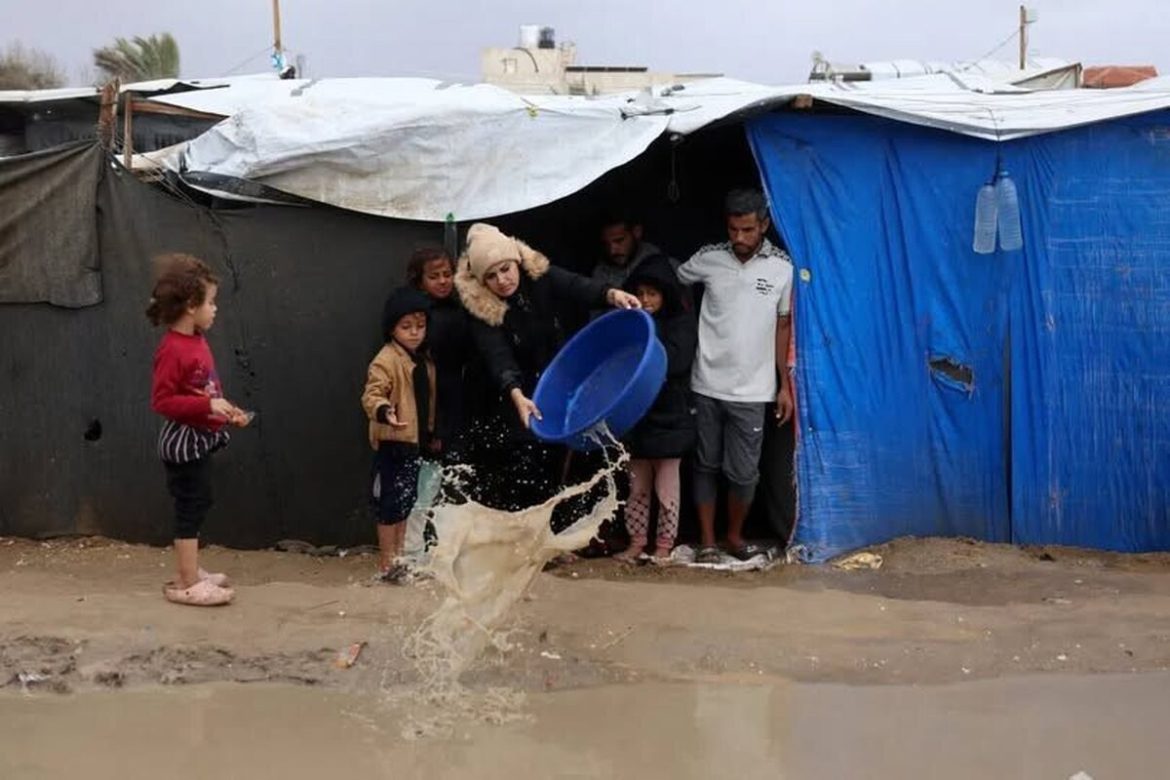Torrential autumn rains have unleashed a new humanitarian emergency in Gaza. Displaced families sheltering in flimsy tents now find themselves knee-deep in water. With winter looming and critical aid still restricted, the situation is escalating into a full-blown disaster.
The Flooding Hits Hard
As the first powerful rainstorms swept across the Gaza Strip on the night of November 14–15, more than 13,000 households were affected by flooding, according to a United Nations humanitarian report. In many places, water broke into fragile makeshift shelters, drenching personal belongings and leaving families exposed to the elements.
The flooding was especially severe in areas like Gaza City and northern Gaza, where dilapidated drainage systems collapsed under the pressure. Meanwhile, in the Khan Younis region — including the sprawling Al-Mawasi tent camp — people reported pitched tents being submerged, while others dug trenches desperately to try to channel the water away.
A Shelter Crisis Deepens
Local authorities describe the situation as the “most dangerous disaster” created by war, with over 288,000 families now squeezed into makeshift housing that offers little protection. The shelters are predominantly thin plastic and fabric tents — materials that the UN says are woefully inadequate against rain and cold.
Philippe Lazzarini, the Commissioner-General of UNRWA (the UN agency for Palestinian refugees), called the conditions “misery on top of misery.” Despite having stockpiles of shelter supplies in neighboring countries, UNRWA has been prevented from delivering a significant portion, according to aid organizations.
Health & Protection on the Brink
The flooding isn’t just a matter of wet tents — it’s raising grave health and protection risks. Waterlogged camps are breeding grounds for disease; stagnant water mixed with damaged sanitation systems can spark outbreaks of respiratory infections, diarrhea, and other illnesses.
UN partner agencies have ramped up distribution of essential winter items, such as tarpaulins, blankets, and new tents, but warn that supplies remain insufficient. In just three days following the storms, more than 83,000 tarps, 59,000 blankets, and 9,000 tents were distributed — a massive effort, but still far short of the growing need.
Aid Blockade Worsens the Emergency
A major obstacle to alleviating the crisis remains the restriction on aid delivery imposed by Israeli authorities, according to Gaza officials. Despite an agreed ceasefire since October 10, vital materials like tents, heaters, and winter supplies are reportedly being blocked.
Aid agencies warn that without urgent action, Gaza could face a catastrophically cold and wet winter. Lazzarini stressed that hundreds of thousands live in shelters that flood easily, soaking people’s belongings and increasing their vulnerability.
Human Stories from the Camps
Displaced residents, many of whom have fled their homes after repeated bombings, say the first rain brought fear, loss, and a renewed sense of desperation. In Gaza City, one man described how he and his children struggled overnight to lift mattresses and their scant belongings to avoid soaking.
Some families fled their flooded tents, while others tried relocating to partially destroyed buildings — yet even these are unsafe. Mothers report that children are cold, afraid, and ill-equipped for the freezing nights ahead.
Why This Is More Than Weather
This is not merely a climatic event: it’s a humanitarian catastrophe built on fragile infrastructure, restricted aid, and years of conflict. Experts and aid agencies say that with winter approaching, the cost of inaction could be measured not just in possessions lost, but in lives.
As Al Jazeera quotes an aid official: “We have a very short chance to protect families from the winter rains and cold.”
Bottom line: The flooding in Gaza’s displaced camps is not just a temporary crisis — it’s a clear signal that the protection, aid, and shelter needs in Gaza are being catastrophically underestimated. Unless the international community acts now, what began as autumn rain may turn into a winter of suffering that goes beyond what many can endure.
From: Fars


